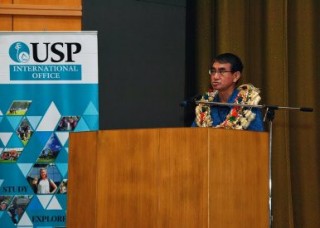Loading
Search
▼ Japan Keen to Bolster Ties with Pacific Island States
- Category:Other
The island states of the Pacific are pivotal to Japan’s free and open Indo-Pacific strategy.
In a demonstration of Tokyo’s recent highly active foreign policy in the wider Indo-Pacific region, last week Japanese Foreign Minister Taro Kono made a four stop tour through the South Pacific. Visiting Fiji, Palau, the Federated States of Micronesia, and the Marshall Islands, Kono announced a number of new cooperative projects centered around sustainable development, maritime law enforcement, disaster management, and enhanced people-to-people links. Kono’s visit to the South Pacific was designed to reiterate the ideals of Japan’s free and open Indo-Pacific (FOIP) strategy to Pacific leaders, and seek to maintain their support for its principles.
The centerpiece of Kono’s regional tour was a speech delivered at the University of the South Pacific in Suva, Fiji. Kono made note that his visit to Fiji was the first by a Japanese foreign minister in 32 years, and the visit back in 1987 signaled the commencement of serious Japanese engagement in the Pacific. Kono highlighted that the five guiding principles of Japan’s foreign policy in the Pacific were established at that time by then-Foreign Minister Tadashi Kuranari during his 1987 visit.
The current foreign minister reiterated that the same principles for Japan’s regional engagement are maintained to this day: (1) respect for independence and autonomy, (2) support for existing arrangements for regional cooperation, (3) assistance in preserving political stability, (4) provision of assistance to make the region more prosperous, and (5) promotion of people-to-people exchanges.
Japan’s engagement in the Pacific became more pronounced in 1997 with the establishment of the Pacific Island Leaders Meeting (PALM), a forum that has been held every three years and that includes all the members of the Pacific Island Forum (PIF). These meetings provide the Japanese government an opportunity to engage in high level talks and find common interests and areas of cooperation with Pacific Island leaders.
This forum was supplemented in 2010 with the PALM Ministerial Interim Meeting, the fourth iteration of which — Kono announced — will be held in Fiji in mid-2020. PALM events are usually hosted by Japan.
The theme of the most recent PALM forum — held in Fukushima May 2018 — was “We Are Islanders – Partnership Towards Prosperous, Free and Open Pacific.” Tokyo has proved keen to highlight a shared identity with Pacific Island countries, and particularly highlighting their shared interests in preserving and managing marine resources. In Kono’s Suva speech the foreign minister created a new complementary set of principles to enhance Tokyo’s continued cooperation in the region: active, opportunity-filled, and innovative. Kono noted that the acronym — AOI — is the Japanese word for “blue,” and tied this conceptually into the idea of the vast Pacific ocean, and by extension the collective Pacific Islands notion of the Blue Pacific.
Enhancing its commitments through the South Pacific is part of Japan’s overall regional strategy to compensate for its capability deficits in both defense and natural resources. These deficits are viewed bluntly through the rise of a strategic competitor, China, and the uncertainty of the regional commitments of Tokyo’s security guarantor, the United States.
These are the principal motivations of the Japanese government’s efforts to try and enhance trading networks, bolster diplomatic ties, and consolidate the Indo-Pacific’s multilateral frameworks. As keen multilaterialists and holders of a significant collective diplomatic weight, Pacific Island countries are willing allies in these goals.
Japan’s over-arching FOIP strategy also intersects well with the vital interests of Pacific Island countries. This includes the maintenance of current maritime laws as defined by UNCLOS, with a particular focus on fisheries management and the protection of Exclusive Economic Zones (EEZs) from illegal fishing; as well as the pursuit of economic prosperity through strengthened connectivity — something incredibly important for remote Pacific Islands countries, and especially for remote islands within Pacific Island countries; that often experience a compounded from of isolation from economic opportunity and essential services.
Kono’s trip through the South Pacific was a demonstration that Japan is keen to maintain its reputation as a good faith development partner in the Pacific. Tokyo constantly emphasizes the “quality” of its development and infrastructure assistance, as a blunt signal that this is something Beijing lacks. Beyond this, Japan’s 2017 Development Cooperation White Paper placed prominent Pacific concerns such a sustainable development and climate change resilience as central features of Japan’s overseas development assistance strategy. This will have been noticed and appreciated in the Pacific. High level visits more frequent than every 32 years would also be noticed and appreciated.
- August 12, 2019
- Comment (0)
- Trackback(0)


